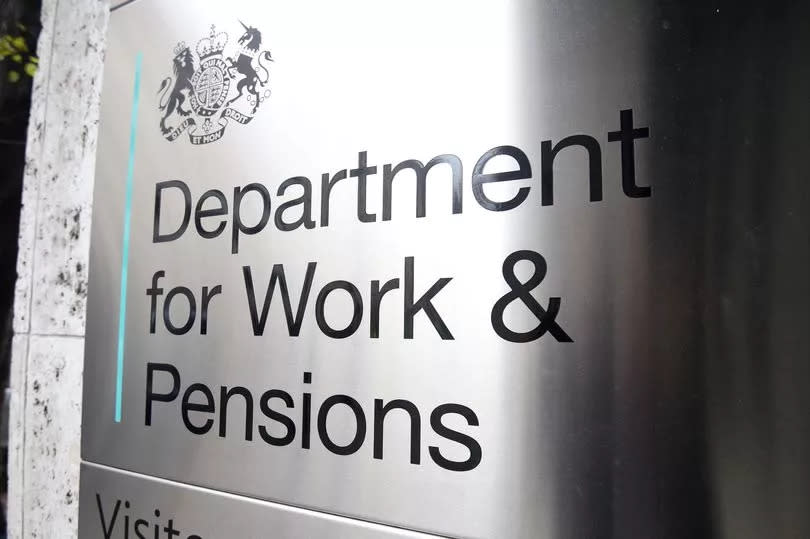Report urges DWP to raise Carer's Allowance to £400 weekly for 1.4 million UK carers

The Department for Work and Pensions (DWP) has been urged to increase the support it provides to carers, amid criticism that current payments do not cover costs. It's estimated that there are 5.7 million people in the UK providing unpaid care for 20 hours or more each week, with 1.4 million claiming Carer's Allowance from the DWP.
A report by TakingCare titled 'Unpaid and under pressure: are Brits trapped caring for elderly parents?' revealed that 82% believe the existing Carer's Allowance of £81.90 a week is insufficient. The DWP benefit can only be claimed by those who provide over 35 hours a week of unpaid care and equates to £2.19 per hour - five times less than the minimum wage.
Alternatively, those on Universal Credit can also receive a separate Carer Element, currently set at £198.31 a month.
When asked about how much money they would realistically need if they were to quit work to care for an elderly relative, 80% of adults surveyed stated they'd need over £100 a week, and 50% said they'd need over £200 a week. One in five adults admitted they'd realistically need £400 a week to care for an elderly parent and cover their costs in the current economic climate, according to Birmingham Live.
The study points out that the rising costs of care homes are impacting people's choices to become carers themselves, with 32% confessing they or their elderly relative couldn't afford a typical four-year stay in a care home. This trend is backed up by Carer's UK, which shows that one in seven carers in the UK juggle work and caregiving responsibilities, often while also looking after their own families and children.
For breaking news in your area direct to your inbox every day, go here to sign up to our free newsletter
Carer's UK's research also uncovers a shocking figure: every day, 600 people quit their jobs to care for someone in need, leading to nearly two million people moving from paid work to unpaid caregiving roles between 2010 and 2020.
Lauren Frake, an expert in elderly care at Taking Care Personal Alarms for Seniors, shared her thoughts on the findings: "Our report shows some of the harsh realities for unpaid carers in our country, with many struggling to cope in the current financial landscape. We have found this is largely due to a lack of wider support available to them; they are simply slipping through the cracks."
Frake underscored the significance of financial literacy for unpaid carers in the face of the cost of living crisis and surging inflation, stating: "Given the current financial climate, it's crucial for unpaid carers to understand what financial support is available to them, particularly in light of the cost of living crisis and rising inflation. One thing unpaid carers can claim for is Carer's Credit, a National Insurance credit that helps bridge some of the gaps in a carer's National Insurance record and helps towards your State Pension."
"Claimants must care for someone for at least 20 hours per week, with the credit allowing them to maintain caring responsibilities and still contribute to their State Pension, which is based on NI contributions. Alongside this, carers should look to their local authority for further support."
"Many councils will have their own list of registered organisations, charities and support groups that can help vulnerable or elderly people in the community. For those caring for elderly friends or relatives, it's advisable to get at-home support through a needs assessment from your local authority which will help open the door to further support."
While the Carer's Leave Act, now in force since 6th April 2024, grants employees unpaid leave to care for dependants, including the elderly, Ms Frake believes it's not entirely adequate. She stated: "This act will undoubtedly provide employees with the reassurance that they have the right to take time off from work to care for their elderly relatives. However, there is still a large gap to fill in providing support to those balancing full-time employment and family life with the responsibility of caring for elderly family members, with many of these carers being women."
The new law allows workers to take unpaid leave to attend to a dependant in need due to illness, injury, disability, or issues related to old age. This entitlement isn't just for family members but also includes anyone who relies on the employee for care.
Employees can take up to one week of carer's leave annually, which is determined by their regular work schedule. For instance, an employee working three days a week would be entitled to three days of leave.
Carer's leave can be taken all at once or spread throughout the year as individual days or half-days.
Lauren stated: "One of the main issues that the UK is currently facing is that elderly care is seen as a taboo topic to many households, with nine out of ten people saying they have not discussed future care plans with their parents, and 50 per cent of people aged 50-plus saying they have not discussed what will happen when their parents become too frail to care for themselves."
"The findings of this survey are exactly why we launched our Have the Talk campaign we want to get Britain talking more openly. Currently, there's a real nervousness and reluctance to ask for help especially as people get older. For many older people, it's difficult to see roles being reversed when they have so often been the carer or even parental figure. Our campaign is about removing the stigma from these conversations and encouraging families to be open and honest with each other when it comes to planning for the future the sooner, the better."
Go here for more news stories about the Cost of Living

 Yahoo News
Yahoo News 
